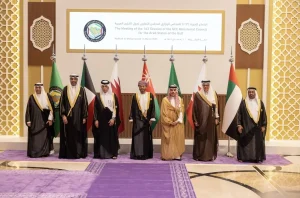Les Émirats arabes unis ont averti le gouvernement israélien que l’annexion de la Cisjordanie serait une “ligne rouge” pour eux, ce qui “mettrait fin à la vision d’intégration régionale”, soulignant que les principes des Accords d’Abraham n’ont jamais été aussi menacés qu’aujourd’hui. Ils ont réaffirmé leur attachement à la solution à deux États pour avancer vers la paix dans la région.
Lana Nusseibeh, assistante du ministre des Affaires étrangères pour les affaires politiques, a déclaré dans des interviews accordées au Times of Israel et à Reuters : “L’annexion sera une ligne rouge pour mon gouvernement, ce qui signifie qu’il ne peut y avoir de paix durable.” Elle a averti que cette décision “anéantira l’idée d’intégration régionale et sonnera le glas de la solution à deux États.” Elle a ajouté que dès le départ, les accords ont été considérés comme un moyen de continuer à soutenir le peuple palestinien et son aspiration légitime à établir un État indépendant. Elle a noté que les propositions d’annexion de parties de la Cisjordanie, discutées au sein du gouvernement israélien, visent, selon un ministre israélien, à “enterrer l’idée de l’État palestinien.”
Nusseibeh a également adressé un message à l’administration américaine, affirmant : “Nous croyons que le président Trump et son administration disposent de nombreux outils pour mener l’initiative d’une intégration israélienne plus large dans la région.” Elle a exprimé sa confiance que le président Trump ne permettra pas aux extrémistes et radicaux de déformer, menacer ou dénaturer les principes des Accords d’Abraham, une pierre angulaire de son héritage. Elle a considéré que l’annexion par le gouvernement Netanyahu de la Cisjordanie signifierait un rejet de facto des Accords d’Abraham, soulignant que “cette option doit être directement soumise au peuple israélien,” avertissant des pertes liées à cette démarche.
Elle a indiqué que les pays arabes restent ouverts à la normalisation des relations avec Israël, mais pas seulement à condition de revenir sur les plans d’annexion, mais aussi avec l’accord d’Israël pour établir une voie fiable et irréversible vers un futur État palestinien.
Elle a ajouté : “Dans chaque capitale arabe que nous visitons, l’idée d’intégration régionale reste possible, mais l’annexion pour satisfaire certains éléments extrémistes en Israël l’annulera.” Elle a déclaré : “Au cours des deux dernières années, notre point de vue est que la vision des Accords d’Abraham reste intacte et que les extrémistes ne doivent pas être autorisés à déterminer la voie de la région.” Cependant, avec les pas croissants d’Israël pour ancrer sa présence en Cisjordanie et à Gaza, elle a déclaré : “Nous sentons tous au Moyen-Orient que nous nous dirigeons vers un point de non-retour.” Elle a averti : “Les principes des Accords d’Abraham — prospérité, coexistence, tolérance, intégration et stabilité — n’ont jamais semblé aussi menacés qu’aujourd’hui.” Elle a poursuivi : “Il y a une main tendue, malgré toute cette misère, dans la région vers Israël.
Mais l’annexion retirera cette main.”
De son côté, le Dr Anwar bin Mohammed Gargash, conseiller diplomatique du président des Émirats, a souligné que le message des Émirats est clair : l’annexion des terres palestiniennes est une ligne rouge, réaffirmant leur attachement à la solution à deux États pour avancer vers la paix. Gargash a tweeté en anglais sur la plateforme X mercredi : “En ces temps difficiles, les Émirats arabes unis envoient un message clair : l’annexion est une ligne rouge, et la paix par la solution à deux États doit rester la voie à suivre.” Il a mis en avant un titre du Times of Israel : “Les Émirats avertissent Israël : l’annexion de la Cisjordanie est une ‘ligne rouge’ qui mettrait fin à l’intégration régionale.”
Le ministre israélien des Finances d’extrême droite, Bezalel Smotrich, a appelé à annexer “toutes les zones ouvertes” des terres, déclarant que le “principe suprême de souveraineté… est le slogan : la plus grande superficie de terre avec le moins de population (palestinienne) possible.” Il a ajouté que l’administration des colonies du ministère de la Défense a récemment dessiné des cartes imposant la souveraineté israélienne sur environ 82 % de la Cisjordanie.
Dans une déclaration, le ministère palestinien des Affaires étrangères a condamné les déclarations de Smotrich appelant à approfondir les colonies et à annexer la Cisjordanie, exhortant la communauté internationale à imposer des sanctions à Israël. Le ministère a considéré ces positions incitatrices comme une menace directe à la possibilité d’établir l’État palestinien selon le principe de la solution à deux États, ainsi qu’une incitation publique contre l’Autorité palestinienne et les droits du peuple palestinien sur sa terre. La Jordanie a également condamné les déclarations de Smotrich, les qualifiant “d’escalade grave et rejetée,” soulignant qu'”Israël n’a aucune souveraineté sur les terres palestiniennes occupées.”
Ahmed Aboul Gheit, secrétaire général de la Ligue arabe, a affirmé dans son discours lors de la session inaugurale du 116e Conseil économique et social arabe au Caire que la préservation du projet d’État palestinien est la question la plus importante pour la prochaine phase, face aux tentatives d’Israël d’effacer ce projet par le déplacement et la saisie des terres.
Par ailleurs, le président américain Donald Trump a renouvelé son appel au Hamas pour libérer tous les otages, indiquant que la guerre israélienne à Gaza prendrait fin si cela était fait. Il a publié sur Truth Social : “Dites au Hamas de rendre immédiatement tous les 20 otages (pas deux, cinq ou sept !), et les choses changeront rapidement. La guerre prendra fin !”













Recommended for you
مدينة المعارض تنجز نحو 80% من استعداداتها لانطلاق معرض دمشق الدولي
طالب الرفاعى يؤرخ لتراث الفن الكويتى فى "دوخى.. تقاسيم الصَبا"
تقديم طلبات القبول الموحد الثلاثاء و640 طالبا سيتم قبولهم في الطب
البريد المصري: لدينا أكثر من 10 ملايين عميل في حساب التوفير.. ونوفر عوائد يومية وشهرية وسنوية
سمو الشيخ عيسى بن سلمان بن حمد آل خليفة يستقبل سفير الولايات المتحدة الأمريكية لدى مملكة البحرين
الجغبير: القطاع الصناعي يقود النمو الاقتصادي